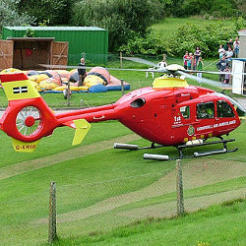The government has announced VAT rebate schemes worth up to £9m a year for hospices, search and rescue charities and air ambulances.
At the moment hospice and search and rescue charities cannot reclaim VAT on goods and services, even though they provide services that the government would otherwise have to provide.
Organisations such as government-run hospices, police rescue services and the Coastguard, which provide very similar services, are able to reclaim VAT they pay on their equipment and fuel.
The promise expected today will mean from April next year, those charities are likely to be able to claim back that VAT putting them on an equivalent footing with government agencies.
The concession comes after long campaigns by the Charity Tax Group together with Hospice UK, the umbrella body for the hospice sector, and care charity Sue Ryder, as well as Cave Rescue and Mountain Rescue charities.
It also follows a report from healthcare regulator Monitor last year, the Fair Playing Field, which recommended all healthcare charities should receive VAT rebates.
The rebate scheme is estimated by the government to be worth up to £5m a year for charities. However combined estimates from charity sources suggest the rebate could save the sector as much as £9m a year.
RNLI estimates it will save £2.5m, while Sue Ryder could save up to £1m.
While the figures involved are relatively small, charity sector tax experts have previously said they hope that rebate schemes for this group could be the first step to wider rebates for the sector.
In total, irrecoverable VAT on charity activities costs the sector between 3 and 5 per cent of all costs – up to £1.5bn a year, according to Charity Tax Group estimates – more than the sector receives in gift aid.
"Delighted"
Welcoming the rebate, David Praill, chief executive of the charity Hospice UK, said: “We are delighted the chancellor has acted to close the VAT gap faced by charitable hospices which, unlike NHS providers, have been unable to reclaim VAT on many non-business supplies.
“This positive change will help relieve the considerable VAT burden on charitable hospices in the UK, enabling them to invest charitable funds in the delivery of front line care and help them reach more terminally ill people and their families.”
According to Praill, the announcement comes as hospices face increased demand for care as a result of the complex needs of Britain’s ageing population.
“Hospice UK, working with Sue Ryder and the Charity Tax Group, have been calling for this anomaly on VAT recovery to be addressed since 2011. It is only right that there is a level playing field between local hospice charities and other providers of palliative care. This rebate scheme recognises the unique contribution of charitable hospices to the health economy and also the invaluable support of local people who give their time to support hospices through fundraising and volunteering.”
John Hemming, chair of the Charity Tax Group (CTG), said: “We are delighted with the announcement in this Autumn Statement that there will be VAT refund schemes for search and rescue charities and the hospices – something on which CTG has been working with Hospice UK and the RNLI and other search and rescue charities over the last couple of years.
"We appreciate the chancellor’s recognition of the important role of these charities providing front-line services – often at considerable risk to their volunteers. The other measures in the Autumn Statement related to charities are also welcome, including the proposed increase in SITR and continued efforts to improve the Gift Aid system for charities.”
In his Autumn Statement speech today, George Osborne said: “Our hospice charities make an enormous contribution to our communities. They have long been subject to unfair rules that force them to pay VAT, when the NHS does not. I am today refunding the VAT that these hospice charities incur.”
Osborne also announced he will use Libor money to fund new helicopters for the Great Western Air Ambulance and Kent, Surrey and Sussex Air Ambulance.
Additional reporting by David Ainsworth.









